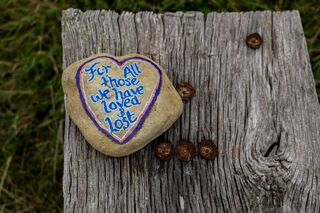Education
Losing and Learning to Let Go
When things don’t go your way.
Posted September 26, 2022 Reviewed by Vanessa Lancaster
Key points
- With many decisions, there are two primary outcomes. Winning and losing.
- Losses, especially significant losses of loved ones, challenge our sense of meaning and create significant grief, suffering, and pain.
- Overcoming losses requires a combination of time, distance, remembrance, and letting go.
We spend so much time thinking about what we can do in life that will bring success or "increase." The increase is about growth and having more—gains, wins, money, purchases, friends, food, or cars.
Think about it. Nearly everything we do in life is about increase. We spend considerably less energy focused on the opposite of increase—loss. Yet, loss is where we need to become more comfortable. In these challenging and stressful times where things didn't go our way, we really learn how to become human and make better choices for the future.

A loss can be defined as a process of losing something, whether it's a game, an object, or a relationship. A loss is a defeat of spirit, if nothing else. Losing is the unfavorable (binary) outcome of a competition or a decision—the state of being deprived of something. Yet, we lose in degrees, which is not binary at all.
As a competitive junior tennis player growing up, I was quite familiar with losing. I believe I lost more matches than I won over my career. Michael Jordan (the champion basketball player) once famously said something like this:
I've missed more than 9000 shots in my career. I've lost almost 300 games. 26 times, I've been trusted to take the game winning shot and missed. I've failed over and over and over again in my life. And that is why I succeed.1
So losing can be interpreted as positive when you think about its long-term learning effect and might eventually lead to better results. But, it is never easy during moments of loss, and sports competitions are still just games. It depends on what type of loss you experience.
As a behavioral researcher and decision scientist, I have found that we lose a lot more than we care to consider. Especially when it comes to negotiations and daily interactions. We might want a higher salary, a lower-priced car, or a European vacation—but instead, we find ourselves settling with different expectations. You might not count these as a loss, but a loss is the opposite of getting what you really wanted (a win). Again, loss is about degrees and not about an all-or-nothing approach.
Here though, I want to focus on losing something much more important than money, an object, or a sports game. I call this a significant loss. I want to talk about losing and letting go, especially of family and friends. If any of you have ever had to bury a spouse, child, or parent, you know quite well the worst kind of loss we confront as humans—significant losses like this impact your memory, outlook, cognition, and future relationships.
I lead a large drug use research program where pretty much every week, we meet a parent or partner of somebody who has overdosed. Nationwide, we had well over 100,000 deaths from this disease alone last year. We can talk all day long about grief counseling, sharing emotions, and support groups, but loss of this nature requires significant time for adjustments within our brain's internal circuitry.
Loss disrupts, fractures, and fundamentally transforms people. The only way to get through this is the eventual and gradual process of re-wiring from what used to be into what is now.
I have had to bury my parent. I've had to put another parent into assisted living. I lost one of my best childhood friends at a very early age. I've gone through the pain of divorce. I have seen loss firsthand from several angles. Many people have experienced it far more than I have. There are so many other kinds of extreme defeats.
My heart sinks every time I read about another school shooting. So many lives stopped short, and so many other lives devastated. And there are many forms of major loss—loss of your ambition and dreams, a miscarriage, and a loss of your career, for example. All require transitions and transformations.
The process of grieving requires a combination of time, distance, remembrance, and letting go. It's a period of great sadness, heartache, anger, fear, and uncertainty. Loss is uncomfortable and overwhelming.
Other people might be mourning a different phase of loss- that which hasn't yet happened but is looming. For instance, parents with children about to graduate and go off to college, or get married and move away, have their own form of loss. Loss can be gradual or happen suddenly. Yet, loss is also inevitable and will impact all of us.
I spend a lot of time contemplating the process of losing and letting go. Through these moments, we could help change, rebuild, and save lives. So how do we embrace this notion of loss and losing what matters?
Most of us know the stages of grief. These have been well-documented and help us understand where we might be in the healing process if healing is linear and standardized. But they aren't particularly useful in gracefully moving us through the stages. I really dislike reading people's trivial thoughts about coping and healing. Loss is so complicated and becoming so common. I wanted to share a few thoughts to set the direction and continue the conversation.
Expect losses. I believe in positive psychology, but at the same time, I feel most people walk through life with a schema that they will win all the time. That just can't be true. If we expect losses to occur, we will be in a better position to interpret and assimilate them. Loss is normal, expected, and part of the human experience. I am uncomfortable with the idea of death or the notion of losing people around me. However, bringing awareness to my flawed underlying schema and remembering that loss is normal and expected brings me marginal comfort.
Acknowledge the discomfort. There is huge discomfort and pain in loss. You can 'name' it, describe it, and think about it. The important thing here is to notice or acknowledge and sit with this discomfort and pain. We don't have to accept or understand it yet, but let's pay attention to it.
Accept that you are not okay. We can call this acceptance, but I believe that this is more about changing your core philosophy to find comfort among that which is uncomfortable. It is okay to acknowledge that you are not okay. At the same time, acknowledge that tomorrow is a new day.
Change your patterns. Loss forces disruption of patterns, so it's a great time to change your habits and daily practices. You don't have to do something extreme but try something different. Meet new people, travel, get on an exercise plan, change your diet, and work to re-wire your experiences. You will never forget about your loss, nor should you. But you can find optimism and hope in new places.
Look for meaning in the loss. I believe there is a reason a person was in your life in the first place or an obstacle was put in your path. Our role should be to search for that meaning, as Viktor Frankl famously taught us.2 Nobody else can help you find that meaning. That's something you have to discover. Commitment to finding purpose going forward after loss is one of our primary missions.
After a significant loss, we will never be the same. But we can renew, evolve, and transform. If you have experienced loss and feel you have mastered the process of losing and letting go, I'd love to hear from you.
References
[1] Michael Jordan Quotes. (n.d.). BrainyQuote.com. Retrieved September 20, 2022, from BrainyQuote.com Web site: https://www.brainyquote.com/quotes/michael_jordan_127660
[2] Frankl, V. E. (1984). Man's Search for Meaning.




